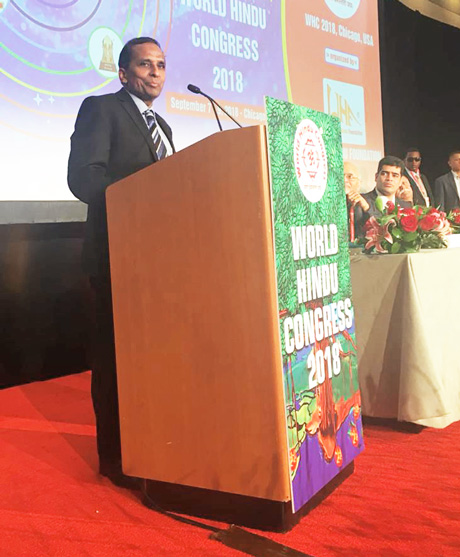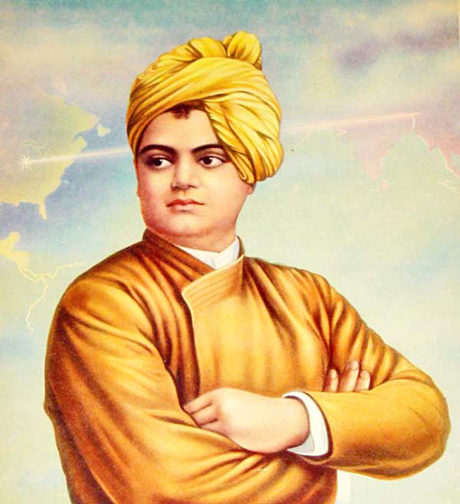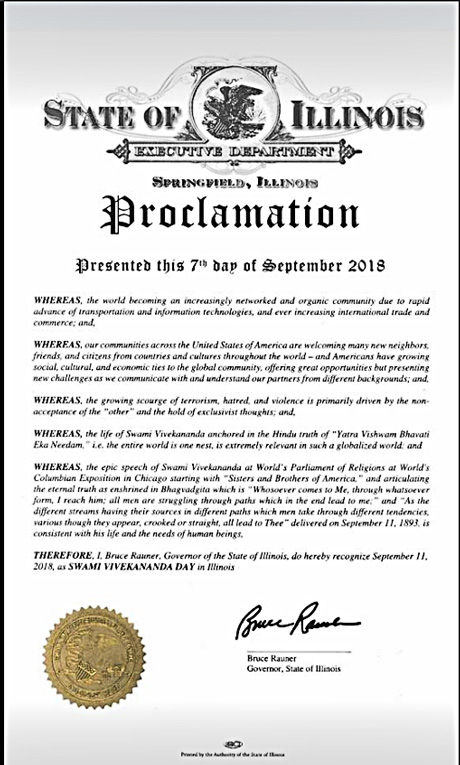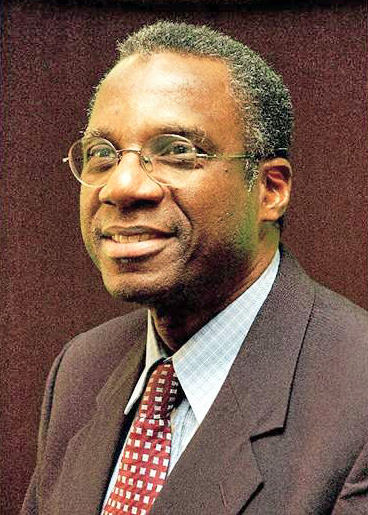
By Ram Sahadeo
Swami Vigyanananda who headed the organizing committee of this august event, blew his conch, recited a mantra calling for unity, and lit a lamp to symbolically banish darkness. There was a moment of silence in memory of former Indian Prime Minister Atal Behari Vajpayee and Nobel Prize winner, late V.S. Naipaul, and over the next three days a star-studded galaxy of leaders from around the world gave eloquent and stirring presentations to the 2500 delegates and participants from over 60 countries who attended the 2nd World Hindu Congress (WHC) in Chicago on September 7, 2018.
India’s vice-president M. Venkaiah Naidu delivered an inspiring valedictory and Bollywood’s thespian Anupum Kher offered a moving inaugural keynote.
The theme of WHC 2018 was Yudhishthira’s advice to Bhima in the Mahabharata (3.37.5), “Sumantrite Suvikrante” (Think collectively, accomplish valiantly).
The WHC is a global congregation of Hindus “to connect, share ideas, inspire one another, and impact the common good”. Held once in four years, WHC’s guiding vision is the quotation from the Bhagavad Gita: “Yato Dharmastato Jaya” (Where there is dharma, there is victory).
The 2018 WHC consisted of seven parallel conferences, one each on economics, education, media, organisation, politics, women and youth. Positive vibrations flowed, commencing with messages from India’s Prime Minister Narendra Modi, His Holiness Dalai Lama, Sri Sri Ravi Shankar and other spiritual giants.
“It was like a mini Kumbh,” is how one of the participants described her experience. As the delegates and speakers shuttled hurriedly among the seven parallel tracks, it was as if they were moving between the ‘ghats’ (banks) for a ‘Ganga snan’ (dip in river Ganga). The ideas came from all directions and streams at the confluence of Chicago – the ‘sangam’. Of course, the deliberations in those panel discussions were thought-provoking and enlightening at the same time.
This year’s event commemorated the 125th anniversary of Swami Vivekananda’s historic September 11, 1893 address at the Parliament of World Religions, Chicago in which Hindu dharma presented itself to the world as modern, rational, humane and pluralistic, encompassing diverse religious and faith traditions. Vivekananda’s call to action was a combination of sacrifice, activism and spiritual growth, meant to uplift and ameliorate both individuals and nations.
The first WHC was held in New Delhi four years ago. Though it created quite some buzz in India, the impact of the Chicago Congress was much more intense, arguably because it had the emotional connect with this American city where Swami Vivekananda had delivered his groundbreaking oration.

In this background of Hindu resurgence, politically and otherwise, the WHC has achieved its major objective – of consolidating Hindus.
Apart from bringing together prominent Hindu think tanks, sects and organisations under one umbrella, the meet was successful in sending out a clear message, especially to India, that an alternative narrative has emerged and is taking a crystal-clear shape worldwide. This new narrative, based on dharma, is as modern as it is scientific, progressive and liberal. But at the same time, it is also firmly rooted in Indian culture and traditions. This narrative is based on the concept of equal treatment and mutual respect, and it proudly underlines the contributions of Indian civilisation to the world.
The conference attracted well-known academics like Professor Arvind Sharma (McGill University), Professor Makarand Paranjape (Jawaharlal Nehru University), Professor Subhash Kak (Oklahoma, State University) and SP Kothari, Professor at the Sloan School of Management, Massachusetts Institute of Technology (MIT).
These scholars not only emphasised these points, but also deliberated about the path forward.
The speech by RSS chief Mohan Bhagwat in the inaugural session set the tone of the conference. His speech, delivered mostly in English, was a sort of a primer of the Hindu civilisation dealing with its ups and downs, strengths and weaknesses, disappointments and hopes.
Bhagwat emphasised the need to seize the moment.
"It is an opportune moment. We have stopped our descent. We are contemplating how to ascend. We are not an enslaved, downtrodden nation. People are in dire need of our ancient wisdom," he said.

Among the dignitaries who attended the conference was Ashwin Adhin, the vice-president of Suriname and US House Representatives Raja Krishnamoorthi and Bill Foster. Bruce Rauner, the Governor of the State of Illinois, sent his message to the Congress and the Lt Governor of Illinois Evelyn Sanguinetti delivered a live speech.
The governor also issued a written proclamation, declaring September 11 as Swami Vivekananda Day in Illinois that was read out during the concluding session.
Caribbean Voices
The Surinamese vice-president Ashwin Adhin insisted that much change is needed and recalled the famous scriptural urging, “Arise, awake, and stop not until the goal is reached.”
Shri Ravi Dev from Guyana roared Swami Vivekanand's famous call-out: “Sisters and Brothers of America and 59 other nations...” He posited that though Caribbean Hindus face challenges, these can be opportunities for positive change. Democracy, he argued, was a Christian notion that came out of the European Enlightenment and that notion is now being threatened even in America by Dharma which is more comprehensive than religion.
Dr. Vindhya Persaud, MP and President of the Guyana Hindu Dharmic Sabha, spoke passionately about preserving Hindu identity in a multicultural society. She dealt with Hindu Women in Education and argued for the empowering of women in the next generation of political leaders. Her eloquence and plea led many women to plan to see her country (Guyana).
Shri Chandresh Sharma, former Minister and MP from Trinidad and Tobago shared his thoughts on how he campaigned and eventually won several elections for the UNC and served in several Ministries.
BAPS, ISKON, Geeta Press, and Chinmaya Mission were recognised for their outstanding contributions not just to a religion, but indeed, to a civilization – a samskriti.
During the event, it was announced that the next WHC would be held in Bangkok in 2022. It is expected that the Bangkok event will have significant impact as there is likely to be more participation of people from India due to its regional proximity.
Moreover, since Thailand is the gateway to ASEAN countries, the event is likely to create a bigger buzz in the region. There are many countries in the region that share historical and culture links with India and this is thus likely to strengthen these bonds.
To crown it all, Vice President Venkaiah Naidu arrived to conclude a remarkable event that no one wanted to end. As he entered, everyone stood and sang the national anthem of India so spiritedly that the walls of the Ashok Singal Hall reverberated.
but move opens up opportunities – economist
Farrell noted what the plant closure opened up was responsibility for the government to create opportunities for the workers being displaced. Additionally, Farrell noted past and present governments had failed the country – that the system being operated was not working for Trinidad and Tobago.
“The country has too high a level of poverty for a country that is supposed to have so much resources. The country has too much, and too high levels of income and wealth inequality for a country that has so much resources and so much potential. The country’s production levels are too low for a country that has so much resources and so much potential,” he said.
He said the closure of the Petrotrin refinery was no different to the total shutdown of Caroni (1975) Ltd.
What this latest closure offers is an opportunity to introduce

“Because there is opportunity for creating business, the government has to stop this focus on these mega projects. Government is not interested in hearing anything unless it costs hundreds of millions of dollars. Why? Because it sounds politically good and because the bigger the project is the bigger it is that people could siphon money off the side,” he said.
Farrell said the government needs to find ways of activating entrepreneurship among the young people.
He said oil and sugar were iconic industries for Trinidad and Tobago. However, nationals should understand that nothing lasts forever.
“The Stone Age didn’t end because of a lack of stones, and the oil age is not going to end because of a lack of oil. There is plenty of natural gas and oil in the ground when the planet has stopped using fossil fuels to generate energy,” he said.
Farrell said creative destruction happens when technological progress destroys industries in the process of making and creating new things – that jobs would disappear. He recalled economists had known that the sugar industry was terminal for at least 30 years, yet the government continued to invest in it to save the jobs of many workers.
“Because a job is for the employee the source of income that puts food on their table, that pays their mortgage, allows them to have a decent standard of living. A job is really something that produces value. If it does not produce value there is no job,” he said.
However, costs begin to pile up, and it becomes unmanageable and taxpayers can no longer bear the costs, he said. He noted it was now the government’s responsibility to invest the revenues and not farm them out.
“The point we make as economists is simply this – that when you do that, when you expend resources and you waste resources like that, it does not come back, it’s lost forever,” he said.
While Farrell’s take on the government’s closure of the refinery was done through the lens of an economist, its direct impact on families was noted in the anxiety being felt on the ground as the layoffs loom.
Penny George, the unemployed wife of temporary Trinmar employee Daniel George, held her third child Micah in her arms as she addressed the forum, pleading for help in understanding the “irrational decision” by the government to downsize Petrotrin by closing its refinery.
Through her tears, George spoke about her two daughters, aged four and six, who suffer with seizures. She wondered if there would be enough counsellors to deal with the trauma her family will face when her husband is out of work. About 2,600 permanent workers, and a similar number of temporary and casual workers are being laid off.
Also speaking at the forum, Crystal Bernard said she wanted to clear up misconceptions perpetuated by Energy Minister Franklin Khan that temporary workers are earning salaries in excess of (TT) $20,000 a month. She is a mother of four children.
Bernard read out her payslip that showed a net income of $1,845.45 a week, after tax deductions, NIS, Health Surcharge and union dues, $1,000 for her car loan plus a mortgage payment of $825, to a credit union.
Out of that sum she also pays utility bills, buys groceries, and makes occasional purchases such as birthday gifts for her four children. Her husband is unemployed. Bernard said the effect of Khan putting into the public domain a claim that she and other Petrotrin temporary workers are earning $20,000 a month was to “have people hate me and be jealous of me”.
“My question to everyone including the Cabinet and the Prime Minister is this: ‘Did you consider me; did you consider my children, or is it that we are just numbers?’ My children are not numbers,” Bernard said as she identified each by name.


